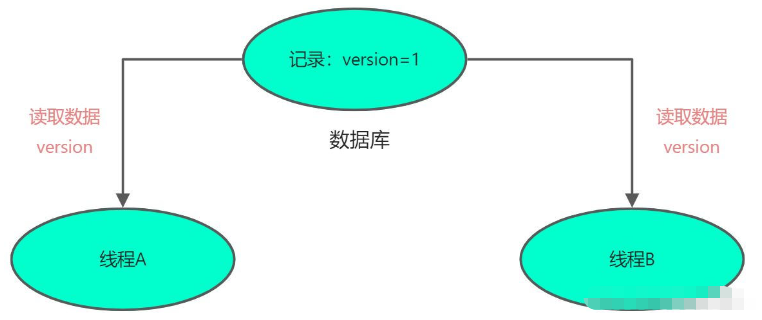这篇文章主要讲解了“MybatisPlus中@Version注解如何使用”,文中的讲解内容简单清晰,易于学习与理解,下面请大家跟着小编的思路慢慢深入,一起来研究和学习“MybatisPlus中@Version注解如何使用”吧!
在 MyBatis Plus 中,使用 @Version 实现乐观锁,该注解用于字段上面
乐观锁(Optimistic Locking)是相对悲观锁而言的,乐观锁假设数据一般情况下不会造成冲突
所以在数据进行提交更新的时候,才会正式对数据的冲突进行检测
如果发现冲突了,则返回给用户错误的信息,让用户决定如何去做
乐观锁适用于读操作多的场景,这样可以提高程序的吞吐量
存在两个线程 A 和 B,分别从数据库读取数据。执行后,线程 A 和 线程 B 的 version 均等于 1。如下图

线程 A 处理完业务,提交数据。此时,数据库中该记录的 version 为 2。如下图:

线程 B 也处理完业务了,提交数据。此时,数据库中的 version 已经等于 2,而线程的 version 还是 1。程序给出错误信息,不允许线程 B 操作数据。如下图:

乐观锁机制采取了更加宽松的加锁机制
乐观锁是相对悲观锁而言,也是为了避免数据库幻读、业务处理时间过长等原因引起数据处理错误的一种机制
但乐观锁不会刻意使用数据库本身的锁机制,而是依据数据本身来保证数据的正确性
本实例将在前面用到的 user 表上面进行。在进行之前,现在 user 表中添加 version 字段
ALTER TABLE `user`
ADD COLUMN `version` int UNSIGNED NULL COMMENT '版本信息';:::info
定义 user 表的 JavaBean,代码如下:
import com.baomidou.mybatisplus.annotation.*;
@TableName(value = "user")
public class AnnotationUser5Bean {
@TableId(value = "user_id", type = IdType.AUTO)
private String userId;
@TableField("name")
private String name;
@TableField("sex")
private String sex;
@TableField("age")
private Integer age;
@Version
private int version;
// 忽略 getter 和 setter 方法
}添加 MyBatis Plus 的乐观锁插件,该插件会自动帮我们将 version 加一操作
注意,这里和分页操作一样,需要进行配置,如果不配置,@Version是不会生效的
import com.baomidou.mybatisplus.annotation.DbType;
import com.baomidou.mybatisplus.extension.plugins.MybatisPlusInterceptor;
import com.baomidou.mybatisplus.extension.plugins.inner.OptimisticLockerInnerInterceptor;
import org.springframework.context.annotation.Bean;
import org.springframework.context.annotation.Configuration;
@Configuration
public class MybatisPlusConfig {
@Bean
public MybatisPlusInterceptor paginationInterceptor() {
MybatisPlusInterceptor interceptor = new MybatisPlusInterceptor();
// 乐观锁插件
interceptor.addInnerInterceptor(new OptimisticLockerInnerInterceptor());
return interceptor;
}
}测试乐观锁代码,我们创建两个线程 A 和 B 分别去修改用户ID为 1 的用户年龄,然后观察年龄和version字段的值
package com.hxstrive.mybatis_plus.simple_mapper.annotation;
import com.hxstrive.mybatis_plus.mapper.AnnotationUser5Mapper;
import com.hxstrive.mybatis_plus.model.AnnotationUser5Bean;
import org.junit.jupiter.api.Test;
import org.junit.runner.RunWith;
import org.springframework.beans.factory.annotation.Autowired;
import org.springframework.boot.test.context.SpringBootTest;
import org.springframework.test.context.junit4.SpringRunner;
import java.util.concurrent.CountDownLatch;
@RunWith(SpringRunner.class)
@SpringBootTest
class AnnotationDemo5 {
@Autowired
private AnnotationUser5Mapper userMapper;
@Test
void contextLoads() throws Exception {
// 重置数据
AnnotationUser5Bean user5Bean = new AnnotationUser5Bean();
user5Bean.setUserId(1);
user5Bean.setAge(0);
user5Bean.setVersion(0);
userMapper.updateById(user5Bean);
// 修改数据
for (int i = 0; i < 10; i++) {
System.out.println("第 " + (i + 1) + " 次修改数据");
final CountDownLatch countDownLatch = new CountDownLatch(2);
modifyUser(countDownLatch, "My-Thread-A", 1);
modifyUser(countDownLatch, "My-Thread-B", 1);
countDownLatch.await();
Thread.sleep(100L);
}
}
private void modifyUser(final CountDownLatch countDownLatch, String threadName, int userId) {
Thread t = new Thread(new Runnable() {
@Override
public void run() {
try {
String threadName = Thread.currentThread().getName();
try {
AnnotationUser5Bean userBean = userMapper.selectById(userId);
if (null == userBean) {
return;
}
AnnotationUser5Bean newBean = new AnnotationUser5Bean();
newBean.setName(userBean.getName());
newBean.setSex(userBean.getSex());
newBean.setAge(userBean.getAge() + 1);
newBean.setUserId(userBean.getUserId());
newBean.setVersion(userBean.getVersion());
int result = userMapper.updateById(newBean);
System.out.println("result=" + result + " ==> " + userBean);
} catch (Exception e) {
System.err.println(threadName + " " + e.getMessage());
}
} finally {
countDownLatch.countDown();
}
}
});
t.setName(threadName);
t.start();
}
}在运行上面代码之前,我们数据库中的记录值如下:
| user_id | name | sex | age | version |
|---|---|---|---|---|
| 1 | 测试 | 男 | 0 | 0 |
运行上面程序,数据库记录如下:
| user_id | name | sex | age | version |
|---|---|---|---|---|
| 1 | 测试 | 男 | 0 | 16 |
1.上面代码将执行10次循环操作,每次操作启动两个线程(线程 A 和 线程 B)去修改用户数据。
2.如果数据没有任何冲突,则用户的年龄应该是 20。但是上面程序运行完成后年龄为 16
3.这就说明,在线程运行的时候,可能A 刚好修改了version,并没有执行完,就到B线程了,就导致B线程修改失败
感谢各位的阅读,以上就是“MybatisPlus中@Version注解如何使用”的内容了,经过本文的学习后,相信大家对MybatisPlus中@Version注解如何使用这一问题有了更深刻的体会,具体使用情况还需要大家实践验证。这里是亿速云,小编将为大家推送更多相关知识点的文章,欢迎关注!
亿速云「云服务器」,即开即用、新一代英特尔至强铂金CPU、三副本存储NVMe SSD云盘,价格低至29元/月。点击查看>>
免责声明:本站发布的内容(图片、视频和文字)以原创、转载和分享为主,文章观点不代表本网站立场,如果涉及侵权请联系站长邮箱:is@yisu.com进行举报,并提供相关证据,一经查实,将立刻删除涉嫌侵权内容。